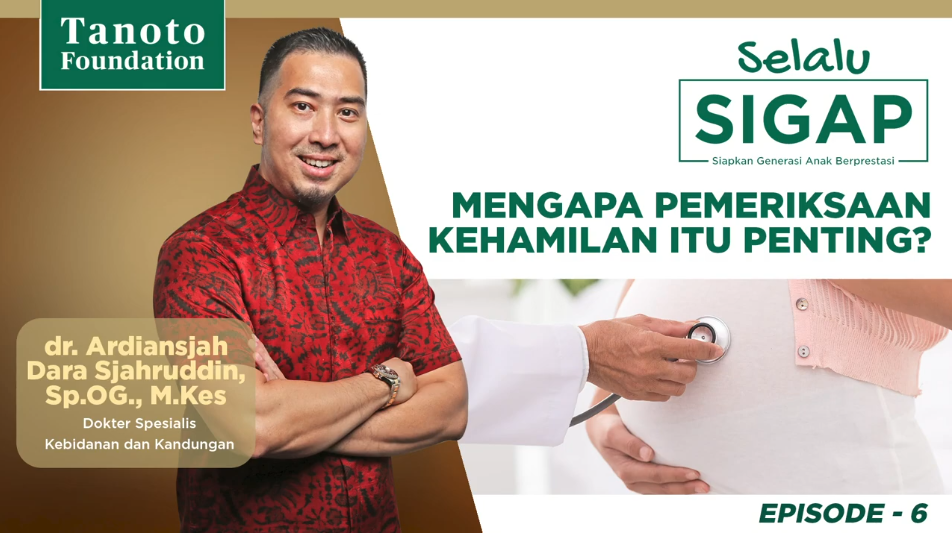Selalu SIGAP #6: Why Antenatal Care is Essential

Proper care during pregnancy is important for both the expectant mother and the unborn baby, but the awareness of antenatal care in some communities may be less than ideal.
The reasons for not getting pregnancy care vary from hesitancy to lack of access, and it can impact the physical and mental health of pregnant women and their babies.
In the sixth episode of Selalu SIGAP, our host Andrea Lee chats with dr. Ardiansjah Dara Sjahruddin, Sp.OG., M.Kes, or dr. Dara, an obstetrician-gynecologist, about the importance of antenatal care and the things you need to know about it.
This episode covers:
a. What is antenatal care
b. Why it is important for expectant mothers and their babies
c. What you need to remember
Pregnancy Care
Antenatal care is a pregnancy examination to ensure the optimal health of an expectant mother and her unborn baby. It should be initiated at the onset of pregnancy to identify any potential risk so that it can be prevented or reduced.
According to dr. Dara, the first examination always includes a check-up with ultrasonography (USG) to ensure that the expectant mother’s uterus contains a gestational sac. A large cavity of fluid surrounding the embryo, it is evident by around day 30 of pregnancy.
A normal pregnancy occurs when an embryo is seen within the gestational sac. But when a fertilized egg grows outside a woman’s uterus, called ectopic pregnancy, it can cause life-threatening loss of blood. This is an example of how antenatal care plays a critical role in preventing any risks to an expectant mother and the baby.
Ideally, an expectant mother should have her pregnancy checked by a doctor once every month to make sure that she and the baby receive the best care possible. But Dr Dara acknowledged that doing so might be a privilege for some people who lack access to such services. For them, he suggested that at least check-ups are done twice in the first trimester, once in the second trimester and once or twice in the third trimester.
Along with a USG examination, antenatal care would also include monitoring the pregnancy progress, identifying any pregnancy complication, providing mothers with vitamin supplementation and discussions about the mother’s medical history and general health.
Doctors will also consult with expectant mothers about the delivery process, ensure their mental wellness and prepare them for taking the baby home.
The Essential Matters
With antenatal check-ups, abnormalities in pregnancy and preventable illnesses can be detected. These include early complications such as hypertension and diabetes in pregnancy that can seriously affect an expectant mother and the baby. Gestational diabetes may increase the risk of high blood pressure for the mother, while the baby may be at risk of excessive birth weight and breathing difficulties.
“Hypertension and diabetes are illnesses that can occur during a pregnancy, even though an expectant mother has no medical history of such illnesses,” said dr. Dara.
“During pregnancy, one might have cravings for sweet foods such as chocolate and ice cream, because those foods provide a feeling of comfort and happiness,” he added. “Pregnant women can go through so many mixed and confusing feelings, and sweet foods can be there as a friend. But too much consumption of sweet foods can lead to diabetes when it is not controlled. And that is one thing that can be prevented with antenatal care.”
For monitoring the fetus’ development in the womb, doctors rely on the use of USG. “With USG, we can minimize any risk of death for the mother and the baby through careful observation,” said dr. Dara.
For example, late in pregnancy a baby might be in a breech position. It is when the baby’s buttocks or feet lie bottom first in the uterus instead of the usual head-first position. With a pregnancy examination, a doctor can provide advice and techniques to move the baby in the uterus. That way, an expectant mother can give birth through a vaginal delivery instead of a cesarean delivery that might pose more risks.
Research showed that having antenatal care visits reduced the probability of neonatal mortality and infant mortality. Antenatal care is critical in improving care of pregnant women, reduce the risk of pregnancy complications and defects, providing accurate nutritional advice and keep track of the fetus’ development.
The Reminders
According to dr. Dara, pregnancy care or examination is crucial to achieve an optimal pregnancy, both for the mother and the baby in the womb.
“The desired output is a healthy baby who is perfectly developed,” he said.
When asked about how some people fear the effect of USG in antenatal care, dr. Dara said that the technique is perfectly safe. By using a high-frequency sound wave, it captures live images from inside the body. There is no radiation involved and it does not pose any danger to the mother or fetus. Moreover, with recent developments USG results can present very detailed images which will immensely help doctors to detect any abnormalities.
dr. Dara also said that in recent years he saw how pregnant women have become more educated due to social media. “We appreciate the YouTubers or Instagram stars and influencers that inform their audience. When expectant mothers come for consultations now, they have a bit of knowledge and they can cross-check the information they received on social media with us,” he said.
Should an expectant mother worry about the cost of antenatal care, he said that there are options ranging from numerous hospitals to community health centers. The latter, for instance, are to be found across Indonesia and provide health care for population on sub-district level.
Listen on Spotify!

Leave a Reply